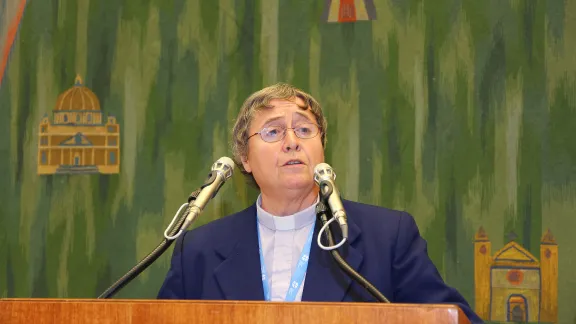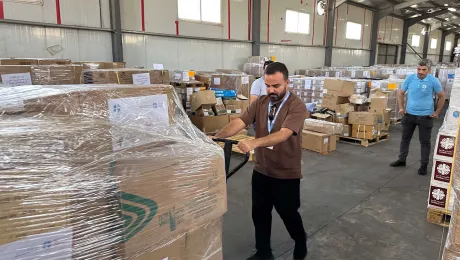
Canon Alyson Barnett-Cowan brings greetings from the Anglican Communion. © LWF/Maximilian Haas
LWF Ecumenical Dialogue Partners Invite Continuing Collaboration
(LWI) Ecumenical guests invited continuing dialogue and collaboration as they brought greetings to the 2013 Council meeting of The Lutheran World Federation (LWF) in Geneva, Switzerland.
The Council met under the theme “Called to Be Disciples in Today’s World.”
In his greeting, Rev. Dr Olav Fykse Tveit, general secretary of the World Council of Churches (WCC), noted that the theme of the upcoming WCC’s 10th Assembly in Busan, Republic of Korea, “God of life, lead us to justice and peace,” echoes the LWF Council theme.
Both topics emphasize the need for prayer and transformative spirituality, he said. “We are called to be together in the world for justice and peace,” Tveit added. The WCC general secretary said that LWF’s preparations for commemorating the 500th anniversary of the Reformation in 2017 offer hope and vision for Christian traditions to share the gospel together.
Rev. Dr Guy Liagre, general secretary of the Conference of European Churches, expressed hope that the Reformation anniversary would offer Christian traditions in Europe opportunity to develop a common vision of their calling as God’s people.
“We can be confident that the future is in God’s hands,” Liagre said. “Let us have the courage to put into those hands our best thinking, our most vital energies and our most joyful praying. There is a need for strengthening the ecumenical Christian voice in this continent.”
Rev. Dr Larry Miller, secretary of the Global Christian Forum (GCF), praised the LWF for playing “an indispensible role in activating and shaping” the forum.
“The LWF’s seeking forgiveness from and reconciliation with Mennonites has become an exemplary story for forum participants—and example to follow in many ecclesial relationships around the world, both between and within confessions,” Miller said, referring to the reconciliation action at the July 2010 LWF Eleventh Assembly in Stuttgart, Germany. .
Many Challenges as Disciples
Rev. Dr Setri Nyomi, general secretary of the World Communion of Reformed Churches (WCRC), said that the LWF Council theme was appropriate for the times.
“In a world in which there is so much pain, conflict, injustice and violence, our call to be disciples has many challenges,” Nyomi added.
He paid tribute to the LWF for participating with the WCRC, WCC and the Council for World Mission (CWM) in a process seeking a new economic and financial architecture to foster life in fullness for all. “This quest is also close to the heart of the LWF.”
Making reference to the report, “From Conflict to Communion,” which was launched during the Council meeting, Monsignor Dr Matthias Türk, representing the Vatican’s Pontifical Council for Promoting Christian Unity (PCPCU), emphasized how important it was for Catholics and Lutherans to be able for the first time to jointly tell the Reformation history.
Türk said the consensus document showed that by putting Jesus Christ at the center, Lutherans and Catholics can commemorate together the 500th Reformation anniversary in 2017. “The goal is to put Christ at the center, to bear witness to him with resolve in the world today. By doing this, we would have fulfilled our duty as His disciples,” he added.
Sacrament of Baptism
Rev. Dr Charles Evanson from the International Lutheran Council (ILC) reminded the LWF governing body that the Sacrament of Baptism was the basis for church unity, adding that more attention should be given to this principle.
“There has not been sufficient theological reflection about the significance of our baptismal ties when and where theological differences arise. It would seem to me that we should address this question together,” Evanson said in the greetings presented on behalf of ILC chairperson, Bishop Hans-Jörg Voigt.
He noted that the common commemoration of the Reformation in 2017 would offer opportunity to “rediscover basic insights of Lutheran theology and to build on them possible common steps of the LWF and the ILC.”
Called to Greater Communion
Canon Alyson Barnett-Cowan, director for unity, faith and order for the Anglican Communion, said Lutherans and Anglicans were being called out of their isolation and self-service to greater communion with one another.
“We are always, in this world, living in conflict between the values of our societies and the values of the realm of God—and it is in this crucible of conflict that we are given grace to grow in the knowledge and love of God and discern how we can be better disciples together,” Barnett-Cowan said.
While both traditions face challenges on how to interpret and live out the gospel, they need to listen for “the still small voice of God’s calm” while continuing to engage with one another, as well as with those holding different views.
“Anglicans are looking forward to walking with you toward the remembrance of 1517, a date significant for all the churches of Christ, particularly in reminding us of the constant need for renewal, and of the need for reconciliation when our zeal for the gospel may take us too far from one another,” she added.
Dr J.D. Plüss, representing Pentecostal churches, offered encouragement to the LWF in its Christian discipleship and ecumenical engagement, particularly as it relates to those with whom it disagrees.
“Let us make it a common prayer, that indeed we all move beyond the communion of like-mindedness, because we are partakers of God’s grace and we want to take the call to discipleship seriously,” Plüss concluded.


